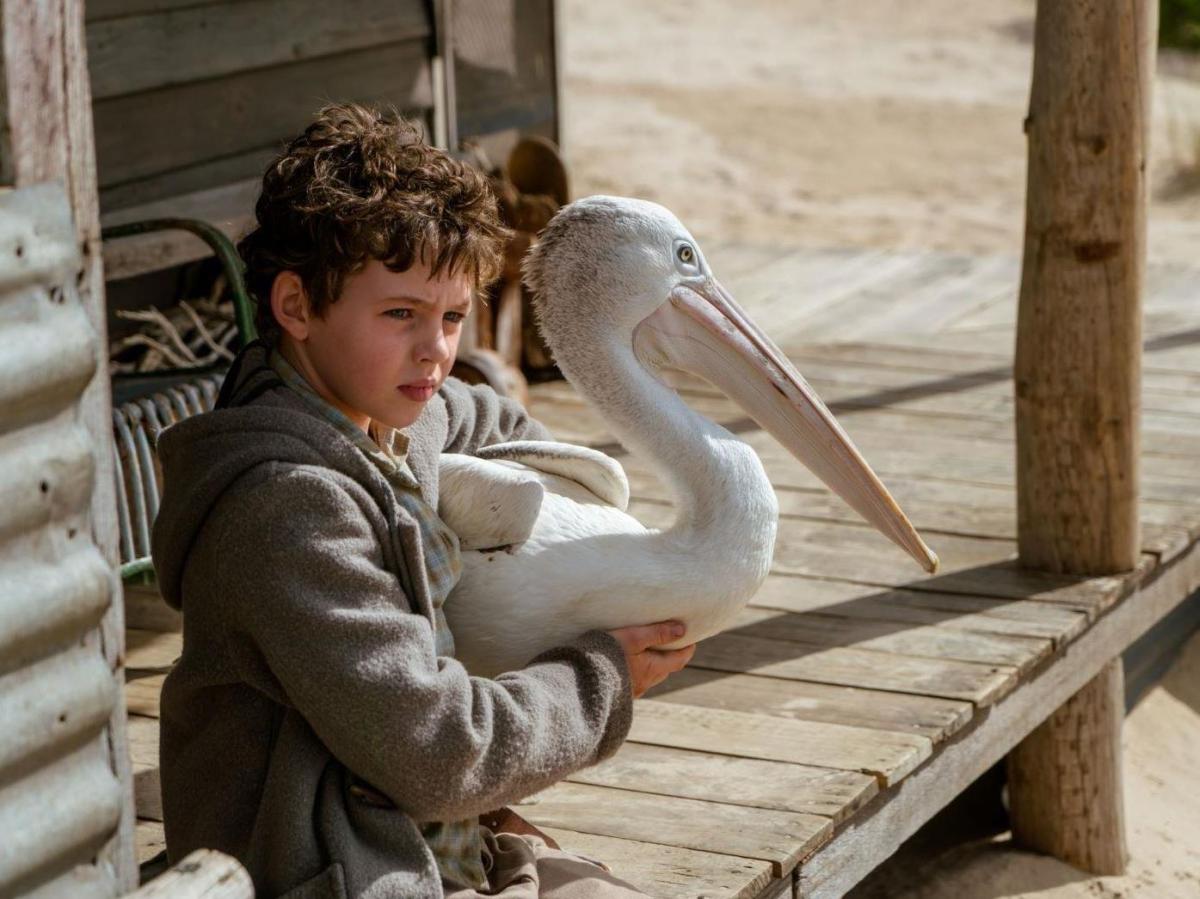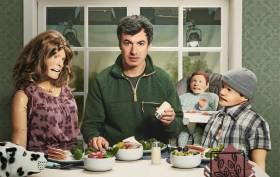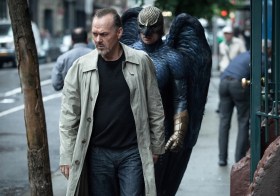Image: Finn Little as the eponymous Storm Boy. Source: Sony
The 1976 adaptation of Colin Thiele’s 1963 novella Storm Boy is rightfully acclaimed as a classic of Australian cinema. So adapting it again, even forty years on, raises a number of questions. Actually it’s the new adaptation itself that raises those questions. When it sticks to the original it’s often the equal of the much-loved 70s version – it’s when it goes off-book that things get a little shaky.
Michael Kingley (Geoffrey Rush) is a millionaire pastoralist now retired to Europe but back in Adelaide to sign off on a mining deal. Going by the protestors outside the office tower, it’s a deal that’s not popular with everyone, especially Kingley’s granddaughter Maddy (Morgana Davies). So when a storm shatters a window just prior to the signing, Kingley uses the delay to spend time with her at the family’s luxury beachside home, and starts telling her a story of his childhood growing up with his father in a beach shack and the pelican friend he made there. That’s right: Storm Boy somehow (the film remains vague as to how he made his fortune) grew up to be Lang Hancock.
This approach turns the original story of Storm Boy into an extended flashback, especially as the film constantly jumps back to the present day to check in on Kingley and his transfixed granddaughter. At first this isn’t much of a problem; both Finn Little as the pre-teen Storm Boy and Jai Courtney as his reclusive father ‘Hideaway’ Tom give compelling performances, balancing the iconic nature of their characters with real human warmth. Unlike the present-day sequences, there’s a real bond between the father and son; Tom might want to be left alone but he’s always a caring father, and Storm Boy’s adventures on the beach (delightfully filmed by director Shawn Seet) have a spirit of free-wheeling exploration that revels in the memorable beachscape of the Coorong national park south of Adelaide, where the original was also filmed.
When Storm Boy rescues a trio of pelican chicks whose mother has been killed by hunters, it’s Fingerbone Bill (the excellent Trevor Jamieson, who played the role in the recent stage version), an Aboriginal man also living alone, who helps teach him how to keep them alive. When Tom meets Bill, there’s no tension – like recognises like, and both men have their reasons for living their solitary lives. But as Storm Boy raises the pelican trio, and forms a growing bond with Mr Percival in particular, it’s clear that he doesn’t share the adults’ aversion to emotional connection. That’s why he can’t stay in their world – but what does that mean for Mr Percival?
There is a reason why Kingley is telling his granddaughter all this, but it’s a somewhat clumsy one, and mostly serves to spell out a range of environmental themes that the core story expresses much more elegantly. Worse, as the story moves towards what was a powerfully emotional ending in the original (what was it with 70s movies and tramautising kids?) this trips up over itself, as the story’s jumping back and forth in time actively and clumsily undercuts the drama. And not just because Kingley didn’t fly into Adelaide at the start of the film with Mr Percival under his arm.
It’s not difficult to see why a remake of Storm Boy might have felt these modern-day scenes were necessary. The original (intentionally) lacks female characters, and Rush was a big box office draw before his current defamation lawsuit against Nationwide News, a News Ltd subsidiary, muddied the waters there somewhat. But it’s hard to argue that in the way they’re used here these modern scenes improve the film; a story of a fisherman and his son living in a shack doesn’t usually need a scene where his future self calls up the family helicopter so his granddaughter can take a quick trip down to the beach.
It’s a shame, because the core of this film really does stand up well against the original. This version is solid family entertainment, and the more obvious environmental themes should play well with younger children (and spark some interesting conversations on the way home). The original might be more subtle and nuanced, but it was clearly made in a different time. If there’s one thing that both versions of Storm Boy make clear, it’s that living in the past is a great way to get your heart broken.
| 3 stars | ★★★ |
Storm Boy
Director: Shawn Seet
Australia, 2019, 1 hr 39 min
Release date: January 17
Distributor: Sony
Rated: PG
Actors:
Director:
Format:
Country:
Release:





